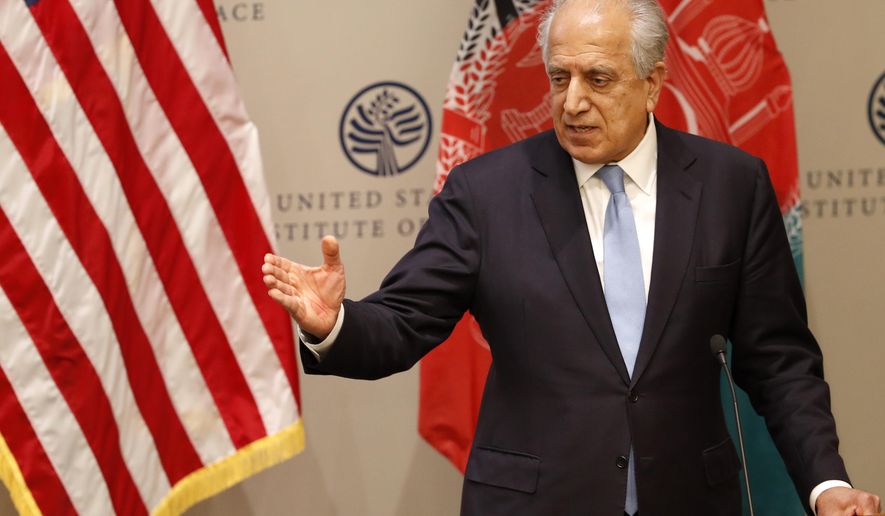American diplomats and the Taliban have agreed in principle to a peace pact that will bring an official end to the longest war in U.S. history, with both sides hopeful a final pact could be in place by July, Washington’s top envoy to Afghanistan said Friday.
July has been set as the goal during the ongoing, bilateral peace talks between Washington and the Afghan terror group, since both sides want a deal in place before the country’s presidential elections that month.
“The peace process is not a straight line, and there could be setbacks,” U.S. Special Representative for Afghanistan Reconciliation Zalmay Khalilzad said. “But there is sufficient time where we could reach an agreement” before Afghans head to the polls this summer, he added during a briefing at the Washington-based Institute for Peace.
But even if a formal deal to end hostilities in Afghanistan cannot be clinched by July, Mr. Khalilzad made clear the Trump administration is focused on ending the 17-year conflict. ” We want the war to end this year,” said the veteran Afghan-born U.S. diplomat.
Mr. Khalilizad’s comments are his first since completing a marathon round of talks with Taliban officials in Qatar in recent weeks. During those talks, Mr. Khalilzad said Taliban negotiators have accepted “in principle” the basic tenets of a peace deal. The talks did not include the U.S.-backed Afghan government, with whom the Taliban have refused to meet.
U.S. negotiators claim they were able to lock in “guarantees and enforcement mechanisms” in the tentative deal, which would ensure Afghanistan would never become a safe haven or harbor for international terror groups like al Qaeda or the Islamic State, Mr. Khalilzad said.
For their part, Taliban negotiators say they have received assurances that half of all the 7,000 U.S. forces currently stationed in Afghanistan would be pulled out by April.
“The Americans told us that from the beginning of February to the end of April, half of the troops from Afghanistan will be withdrawn,” Taliban official Abdul Salam Hanafi told the Associated Press on Wednesday.
Taliban lead negotiator Mullah Sher Mohammad Abbas Stanikzai said last week that U.S. and Taliban negotiators have agreed in principle to create a pair of “technical teams” that will spearhead planning for a U.S. withdrawal
Mr. Khalilzad quickly dismissed such claims, taking to social media Wednesday to make clear neither side discussed or agreed to a timetable for an American withdrawal. On Friday, he reiterated that ongoing talks with the Taliban remained focused on ending the conflict.
“We are not seeking a withdrawal agreement, but a peace agreement,” Mr. Khalilzad said, noting “the Taliban say they prefer that too.”
Mr. Trump is reportedly weighing plans to pull 7,000 American troops — or half of all U.S. forces in the country — from Afghanistan as Washington continues to spearhead peace talks with the Taliban.
“We’re going into close to 19 years in being in Afghanistan and for the first time, [the Taliban] are talking about settling, talking about making an agreement, and we bring our people back home if that happens,” Mr. Trump told reporters late last month.
But Senate lawmakers are pushing back on a U.S. troop drawdown, approving a non-binding resolution pressing the administration to reconsider the effect of a mass troop withdrawal from Afghanistan and if it could give groups like the Taliban an advantage over the U.S. and its allies.
“Our presence is conditions-based and our withdrawal [will be] conditions-based,” Mr. Khalilzad said, adding his team will continue to strive for a peace deal that meets Washington and Kabul’s interests.
“There are groups [in Afghanistan] who never want us to leave, there are groups who want us to leave immediately. … The question is, How do you resolve those differences?” he said.
• Carlo Muñoz can be reached at cmunoz@washingtontimes.com.




Please read our comment policy before commenting.